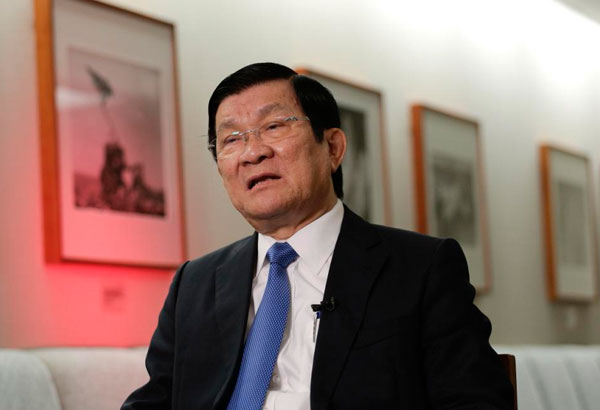
Vietnamese President Truong Tan Sang listens to questions during an interview, Monday, Sept. 28, 2015, in New York. Sang told The Associated Press on Monday that China’s island-building in the disputed South China Sea violates international law and endangers maritime security. (AP Photo/Julie Jacobson)
Vietnam's president told The Associated Press on yesterday that China's island-building in the disputed South China Sea violates international law and endangers maritime security.
President Truong Tan Sang also urged the US, which has expressed mounting concern over China's assertive behavior, to fully lift a ban on lethal weapons sales to Vietnam.
Sang said that would demonstrate to the world that US-Vietnam relations have been fully normalized, 40 years after the end of the Vietnam War.
Sang was speaking in an interview with The AP as world leaders gathered at the United Nations.
Communist-ruled Vietnam and China have long-standing fraternal ties but tensions have grown over oil exploration in disputed waters, and as China has undertaken massive land reclamation in the Spratly island chain, also claimed by Vietnam.
"The East Sea is indeed a hot spot of the region and the world at this point, and in the last year China has done large-scale reclamation of submerged islands to make them very big islands," Sang said, using the name Hanoi uses for the South China Sea.
"We believe that these acts by China violate international law," he said, citing the UN convention of the law of the sea. He added that it also infringes a declaration of conduct reached in 2002 by members of the Association of Southeast Asian Nations.
He said the concerns of Vietnam and other Southeast Asian nations are "obvious and easy to understand because the acts by China seriously affect the maritime safety and security in the East Sea." He underscored the importance of a peaceful environment to realize new goals for sustainable development just agreed at the UN.
In Washington last week, China's President Xi Jinping said the Chinese have "the right to uphold our own sovereignty" in the South China Sea, where Vietnam, the Philippines, Taiwan, Brunei and Malaysia also have competing claims to tiny islands and reefs. China has reclaimed about 3,000 acres (1,200 hectares)of land in the past year-and-a-half by dredging sand from the ocean bed, and is building airstrips and other facilities that the US is concerned could have military uses.
While Sang talked tough on China, he had warm words for the United States, and looked for further steps to cement stronger ties.
"The moment the United States fully lifts the ban on lethal weapons sales to Vietnam will send a signal to the whole world that the Vietnam-US relations have been fully normalized" and there's no mistrust between the two nations, Sang said.
A visit by President Barack Obama to Vietnam — possibly this fall, when the US leader is due to visit the region — would also consolidate a comprehensive partnership formalized between the former enemies when Sang visited Washington in 2013, he said.
Last October, the US announced it would allow sales, on a case-by-case basis, of lethal equipment to help the maritime security of Vietnam — easing a ban in place since communists took power at the end of the Vietnam War in 1975. But the Obama administration has said that Vietnam needs to improve human rights conditions for the relationship to reach its fullest potential. US lawmakers also feel that Hanoi should clean up its human rights act before getting privileges in the Trans-Pacific Partnership trade deal currently under negotiation. Vietnam is one of 12 nations in the agreement which appears close to completion.
Sang expressed willingness to keep discussing human rights with the US He said that a chapter on human rights is now included in Vietnam's constitution, and that implementing legislation would be enacted in the "next few years" so those rights are fully in place "on the ground."
Human rights groups remain critical of Vietnam's record. While conditions have improved sharply on the immediate post-war era of re-education camps, its record on freedom of expression is poor and the government remains intolerant of dissent.
According to the US State Department, at the end of 2014, Vietnam was holding about 125 political prisoners.
http://www.philstar.com/world/2015/09/29/1505215/vietnam-leader-china-island-work-violates-international-law

No comments:
Post a Comment
Note: Only a member of this blog may post a comment.